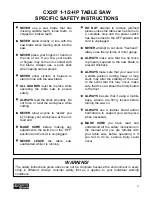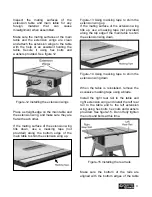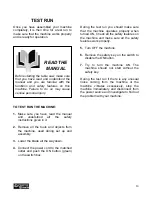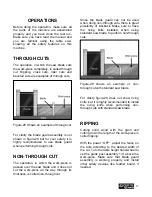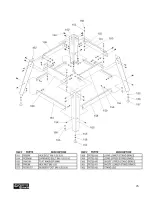
17
OPERATIONS
Before doing the operation, make sure all
the parts of the machine are assembled
properly and you have done the test run.
Make sure you have read the manual and
you are familiar using the table saw,
knowing all the safety features on this
machine.
THROUGH CUTS
The operation, in which the saw blade cuts
the work-piece completely, is called through
cut. Ripping, cross cuts, miter cuts and
beveled cuts are examples of through cuts.
Figure-28 Shows an example of through cut
For clarity the blade guard assembly is not
shown in figure-28 but for your safety it is
highly recommended to use blade guard
when performing through cuts.
NON-THROUGH CUT
The operation, in which the work-piece is
passed over the saw blade and it does not
cut the work-piece all the way through its
thickness, is called non-through cut.
Since the blade guard can not be used
when doing non-through cuts, there is great
possibility of kickback. Make sure to have
the riving knife installed, when using
standard saw blade to perform non-through
cuts.
Figure-29 shows an example of non-
through cut with standard saw blade
For clarity figure-29 does not show riving
knife, but it is highly recommended to install
the riving knife when performing non-
through cuts with standard saw blade.
RIPPING
Cutting solid wood with the grain and
cutting down the length of the work-piece is
called ripping.
With the power “OFF”, adjust the fence on
the rails according to the desired width of
the cut. Turn the table height hand-wheel to
set the guide post assembly 1/4” above the
work-piece. Make sure that blade guard
assembly is working properly and install
other safety devices like feather board, if
needed.


